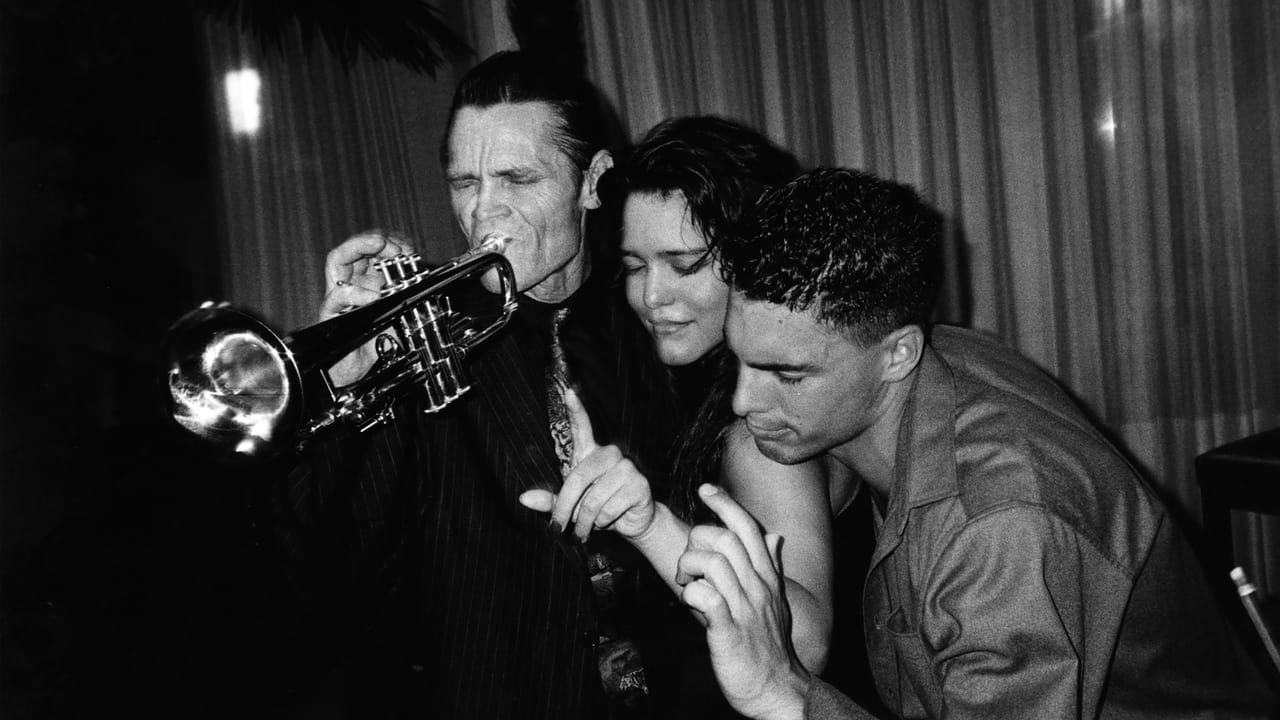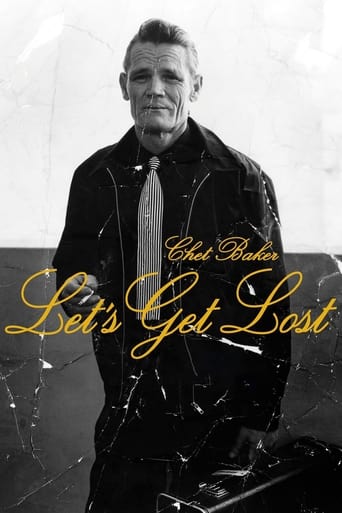



Instant Favorite.
Good concept, poorly executed.
The acting is good, and the firecracker script has some excellent ideas.
View MoreBlistering performances.
In the 1950's, cool was the only way to fly, and Chet Baker was what James Dean always wanted to be. Those cool cat days, where the "cool" kids of today would be seen as jerks, sissies, geeks, nerds or worse, had a very restrictive behavioral code...you kept your icy cool at all times in a very narrow emotional range no matter what happened, and never acted beneath your age or silly or goofy, both of which are so commonplace in today's arrested-development kids of all ages. That detached air was the very essence of cool then, along with the ducktail hair, the jeans, the smokes rolled up in a t-shirt sleeve, the coffee bars, the hot rods, and the gals.....with their angora sweaters that balled up when felt up. Those were the glory days shown in this film that were so attractive to us then. Every day a salad day, but those soon turned into grass days and then into poppy days for poor Chet.Chet was all of that cool cat essence early on, and so much more for jazz lovers, especially in his recordings with Russ Freeman arrangements and accompaniment. The Okie Adonis Baker had almost no education or sophistication and was so easy, soft and simple cool, too simple and easy.......and he became a living sucker perfectly ripe for the easy plucking by promoters, fellow musicians and fame-loving men and women alike. And was he ever plucked, but he didn't resist too much as his soft, sad personality was like a blotter....a reflection of what life happened around him but not a significant happening in itself, other than his unique musical expressions.In the film, it was plain to see that the last 20 years of his life were the killer drug years, as in 1967-68 he was seen to still look and sound good. It all went downhill from there, but the soul-sensitive voice, the soft trumpet toning that was always more an extension of his voice than a separate instrument, were still intact and probably more sensitive and sadly expressive than ever. Yes, Chet was a sad man of obvious low self esteem common to kids raised in near poverty, but shame and embarrassment for his many flaws had been well beaten out of him by life at the end. He was, as were many in his world, of the character and in the environment that made him an easy target for any addiction that allowed him the freedom to lose himself into his music and be cooler to himself and to the vices common to his world.... fast women, hard drugs, and getting by on his talent alone without having to work hard for a living. Whatever was easiest and felt best was always what Chet did and, and as with many of the most talented in any endeavor, he failed at most of these except for his music, and his resulting God-may-take-me-at-any-time-who-cares? malaise was clearly present and almost pleading for it near the end when answering interviewer questions in a drugged-out stupor. I think he fell out of that hotel window in one of his drug stupors and died from it, on purpose or not. Simple as that, knowing he was a deep-in-a-dream junkie. No embellishment to it for effect is probable, like he did so often for sympathy or for a few extra bucks he never seemed to save from working a thousand gigs all over the world in 40 years. I just hope his wife Carol and his 3 kids saw some money from the big nostalgia CD sales resulting from this film. They sure looked as though they could use it. From their share of the proceeds from my Chet CD collection alone, they should be a lot better off than they looked in the film.Roland's on Steiner in the Marina and The University Hideaway on upper Fillmore in San Francisco were my early hangouts in those days, and I can still feel Chet's mood near there on cool, foggy SF evenings that are so common there even if Chet is long gone, along with those old places. With enough time, his many failures in his personal war with life will be forgotten by all until only his great music remains to mark his legend.
View MorePretty sad stuff here. Chet Baker, a kid from Oklahoma, learned to play the trumpet and became famous in the early 1950s, partly because of his talent and partly because of his looks. He came to wide public notice as the complement to Gerry Mulligan's baritone saxophone in the piano-less quartet of 1952-1953. The sound was contrapuntal, uncanny, and unique. There had never been anything like it, and nothing since. But the two didn't get along that well, and Baker established his own groups and began doing the vocals as well in a voice about as good as yours or mine.By the end of the 50s Baker was on a downhill slide. A lot of his work, said to be fine, from the 1960s isn't readily available. Unfortunately what is available is Chet Baker crooning love songs and playing mood music at the slow tempos he seemed able to keep up with.By the time of this documentary, 1988, Baker no longer looked like James Dean. His face was that of a pinched, wrinkled, Oklahoma farmer out of a Walker Evans photograph from the Great Depression.I can't give director/photographer Bruce Weber credit for much in the way of generosity. There are too many stark, black-and-white closeups of that ruined face and stringy hair. The semi-stoned intonations of Baker's voice I attribute to increased age or current drunkenness. But the high-contrast photography is hard to forgive. Weber made his name in commercial photography. Most people probably remember his photos of half-nude young men. One of them, an ad for Calvin Klein, has a male model posed naked except for white briefs lighted in such a way that his genitalia were prominent. I don't find the picture offensive, only the motive behind it, which I take to be a desire to shock and to have one's name remembered. (Richard Avedon, a cynic if there ever was one, pulled the same trick with celebrity portraits that made the subjects seem ancient, debauched, or insane.) The same motive seems to lie behind the photography in this film, some arty shots of dogs prancing around in Santa Monica aside.Weber let's some of the people interviewed describe Baker's charm and his innate skills on the trumpet. Jack Sheldon, a trumpeter himself and one-time sidekick on a late-night talk show, is hilarious. Baker seemed to have second sight, says Sheldon. He didn't have to think about what note he was playing, he just put his fingers on the valves. "It was easy for him to know where he was. Not like me. I forget what bar I'm in. In fact -- where are we now?" We also get an assessment from one of Baker's embittered ex girl friends who puts him down scathingly, though she evidently had reason to. Nobody ever says, "Chet Baker -- what a nice guy he was." There's quite a lot of interview footage, as a matter of fact. Weber put a lot of effort into the film. And considerable footage from the 50s as well, including an appearance by Baker on TV with Steve Allen, a host and a fellow musician. Mostly, though, what we hear on the sound track is Baker mooning along slowly and feebly through love songs and mood pieces.See it, really, but be warned. It's gripping but it's painful too.
View MoreThis film is a must see for any Baker fan and even any Jazz fan. Baker really did redefine the 1950's jazz scene with his combination of mesmerising trumpet playing and angel like vocals. His instantly recognisable style has brought joy to many jazz fans over the years and even now his legend lives on some 16 years after his death in the most mysterious of circumstances.This film tells a very candid story of Chet charting his terrible affliction with drugs as well as honing in on his god given talents. It is very highly recommended and is long overdue for a release on DVD as some fellow reviewers have alluded to. I will certainly be first in the queue to buy this must see title if and when it is re released.
View MoreThis film is long overdue to be remastered and released on DVD. The VHS transfer seems quite lazily done. The opening title pretty much goes off the screen on my TV. Would love to see this film in all its glory once again.
View More